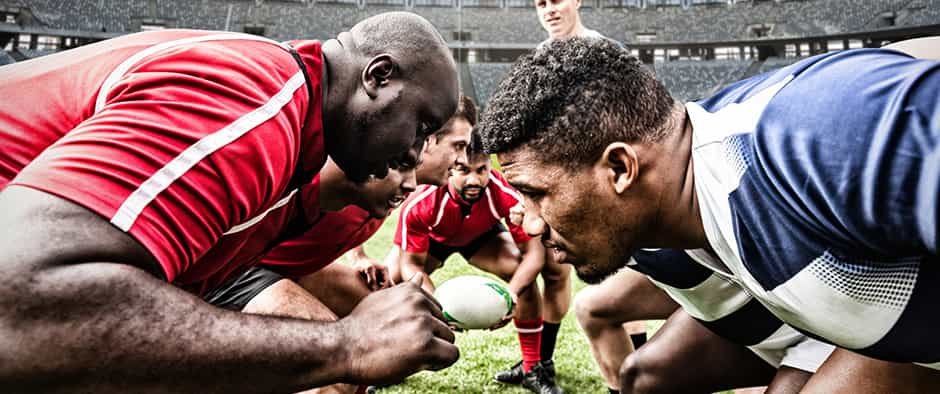The Rugby World Cup’s Biggest Upsets
Rugby union fans have grown accustomed to watching unheralded teams suffer brutal defeats at the World Cup since it was inaugurated in 1987. There have been some absolute pastings over the years, from Australia’s 142-0 win against Namibia to England’s 111-13 demolition of Uruguay in 2003. However, every so often an underdog defies the odds to secure an improbable victory on the biggest stage of all. Read on to learn more about the top five upsets in Rugby World Cup history.

France 43 New Zealand 31, 1999
France and New Zealand are the joint favourites with many online betting sites to win the 2023 Rugby World Cup. Both teams are blessed with a wealth of world-class talent, so it is easy to see why they are held in such high regard by the bookmakers. If you’re looking for the latest RWC odds, Ladbrokes, Unibet and various other sites are offering 3/1 on either team lifting the trophy this autumn, although you can find a market leading 10/3 on Les Bleus at William Hill.
If you’re not sure who to bet on from our table below, check out our Rugby World Cup betting preview for more insights on what to bet on during the tournament.
However, back in 1999, there was a vast gulf in quality between these teams. The All Blacks were the clear favourites to win the tournament. They had suffered a disappointing defeat to South Africa in the final of the previous World Cup, but head coach John Hart had overseen an impressive rebuild. New Zealand had won three Tri-Nations titles, and they were surging with momentum as they headed to Europe for the tournament.
They lived up to their billing by cruising to victory against Tonga and Italy, before sweeping aside England at Twickenham, led by the unstoppable Jonah Lomu. The All Blacks outclassed Scotland in the quarter-finals, teeing up a semi-final showdown with France. It was seen as a mere formality, as they were expected to run rings around Les Bleus and book a place in the final with ease. After all, France had finished bottom of the Five Nations table earlier that year, and their route to the semi-finals had been straightforward.
However, what unfolded was one of the most remarkable upsets in World Cup history. Not only did France win, but they destroyed the All Blacks at Twickenham. Les Bleus came flying out of the blocks, as Christophe Dominici cut through the Kiwi rear-guard and handed the ball to Richard Dourthe, who played in Christophe Lamaison for the opening try. Lamaison was only in the team after replacing the injured Thomas Castaignede, but he took his chance with aplomb.
New Zealand quickly rallied and found themselves 14 points ahead courtesy of a two-try salvo from the irrepressible Lomu. Yet France refused to throw in the towel. They scored successive drop goals and chipped away at the All Blacks’ lead through two penalties, sparking panic within the Kiwi ranks. Tries from Dominici and Dourthe handed France the initiative, and flanker Oliver Magne produced a moment of magic to send Philippe Bernat-Salles away for a breakaway try, sparking pandemonium among the French fans in the stands.
Jeff Wilson crossed for a late score, but it proved to be a mere consolation. France went on to lose to Australia in the final, but that heroic performance in Twickenham will live long in the memory. Les Blues and New Zealand have landed in the same pool for the 2023 World Cup, so that performance may inspire Antoine Dupont and co.
Wales 13 Western Samoa 16, 1991
Western Samoa pulled off one of the greatest shocks in sporting history by beating Wales at the 1991 World Cup. The Welsh were among the favourites to lift the trophy, having reached the semi-finals of the previous World Cup. They had suffered a few defections to rugby league in the ensuing years, but they were still expected to go deep into the knockout stage of a tournament they were co-hosting.
Their opening group match pitted them against Western Samoa, a small Pacific island nation with a population of around 200,000, at Cardiff Arms Park. The Western Samoans were making their World Cup debut, and they were widely expected to be the whipping boys of Pool 3 after being drawn against Wales, Australia and Argentina.
However, they displayed phenomenal levels of physicality in front of a hostile Cardiff crowd that day. Back-rower Apollo Perelini was dubbed “the Samoan Terminator” after hospitalising three Welsh players – Richie Collins, Phil May and Tony Clement – with his ferocious tackles. Wales managed to get through to half-time with the scores level at 3-3, but they were clearly rattled. In the opening minute of the second half, centre To’o Vaega kicked ahead and chased the ball in a bid for the touchdown. Robert Jones matched him stride-for-stride, and replays showed that the Welsh scrum half reached the ball first. The spectators were expecting a 22-metre drop-out, but instead French referee Patrick Robin awarded the Western Samoans a try after deciding that Vaega won the race.
It was a poor decision, but the 9-3 lead was no less that Western Samoa deserved. They had dominated the lineout, flourished the loss and made all the running. There was no doubting the legitimacy of their second try, as a silky move ended with flanker Sila Vaifale crossing. The Western Samoans began to tire and Wales rallied, closing the deficit to four points via Arthur Emyr scored and Mark Ring’s conversion. However, Mathew Vaea’s late penalty extended the underdogs’ lead to seven points and an injury-time try from Ieuan Evans proved to be inconsequential. It was the darkest day in Welsh rugby history, leading many fans to quip: “Thank goodness we weren’t playing all of Samoa!” Wales crashed out at the group stage, while Western Samoa made it all the way to the quarter-finals before losing to Scotland. Eight years later, Wales did indeed play all of Samoa, and the Pacific Islanders pulled off yet another upset by beating their Welsh opponents 38-31 at the 1999 World Cup.
New Zealand 18 France 20, 2007
France’s narrow victory over New Zealand at the 2007 World Cup was an even greater shock, as the All Blacks were outrageously dominant at the time. They had won 34 out of 39 Tests since the previous World Cup, they had won three consecutive Tri-Nations titles and they had also inflicted a record defeat upon the British and Irish Lions. What’s more, they were unbeaten against European opposition in more than four years, and they had recently handed both France and England their heaviest home defeats.
As such, they began the tournament as the 4/7 favourites with leading online rugby betting sites such as Bet365 and Paddy Power. It is very rare to see an odds-on favourite for a major tournament like the Rugby World Cup, but it underscores just how brilliant the All Blacks were in 2007.
France were the 8/1 second favourites for the tournament, having beaten Ireland on points difference to claim the Six Nations earlier that year. However, everyone expected them to be outplayed when they finally collided with the All Blacks. Any pre-tournament optimism felt by the French fans faded after they finished second in Pool D, behind Argentina, meaning they had to face New Zealand in the quarter-finals – earlier than anticipated.
France tried to show that they were unintimidated, as they stared down the New Zealand haka before kick-off. However, the opening stages of the match went to script, as the All Blacks dominated the first half. Yet they only had Luke McAlister’s try to show for it, leading 13-6 at the break. McAlister was sin-binned early in the second half, and France capitalised. Their backs sprung into life, and Thierry Dusautoir levelled the scores.
New Zealand managed to restore their lead through Rodney So’oialo’s try. France responded by sending on Frederic Michalak, who turned the game on its head. The fly-half produced a burst of pace to evade the All Blacks and then he offloaded to Yannick Jauzion to score what proved to be the match-winning try. It was backs-to-the-wall defending from that point onwards, but France held on for the win, and New Zealand failed to reach the World Cup semi-finals for the first time in their history.
Japan 34 South Africa 32, 2015
Japan pulled off arguably the greatest shock in rugby union history when they stunned two-time world champions South Africa in 2015. Some rugby betting sites installed the Springboks as the 1/500 favourites to win the match, meaning you would have needed to risk £500 to win just £1, while Japan started the game as the 80/1 underdogs. Those prices spoke volumes about the enormous chasm in quality between the two teams.
The Brave Blossoms had only ever won a single World Cup match in their entire history, and that came against an unheralded Zimbabwe team 24 years previously. Meanwhile, the Springboks boasted a combined 851 caps, and they were among the favourites to win the trophy.
They played reasonably well on that fateful September afternoon at the Brighton Community Stadium, but every time they took the lead, Japan found a response. The Springboks took a 12-10 lead through tries from Francois Louw and Bismark du Plessis, but Japan captain Michael Leitch – who was born and raised in New Zealand but moved to Sapporo at the age of 15 – hit back with a try of his own.
The lead see-sawed throughout the game. Lood de Jager and Adriaan Strauss crossed for South Africa, but Ayumu Gorumaru contributed 24 points to keep Japan within touching distance throughout. They were trailing by three points in the closing stages, and they laid siege to the Springboks’ line. Twice, they opted against kicking a penalty that would have earned them a famous draw, as they decided to press for a winner instead.
That bold decision finally paid dividends for Eddie Jones’ men, as Karne Hesketh crossed in the final minute to win it for Japan. It was spine-tingling stuff, and the match has been dubbed “The Miracle of Brighton” thanks to the shock result. The Brave Blossoms were courageous throughout, but to have the audacity to push for a try in the dying embers of the match showed just how bold they were that day.
England 25 Wales 28, 2015
Wales overcame a 10-point deficit and a series of damaging injuries to stun England in a World Cup thriller back in 2015. England went into the match as the 1/3 favourites, while Wales were 11/4 underdogs for the group stage match. However, the English then became the overwhelming favourites in the live betting odds after opening up a seemingly unassailable lead, only for Wales to produce a miraculous comeback.
England gradually tightened their grip on the game in the first half. Owen Farrell’s drop-goal crept over to make it 9-6, and Ben Youngs then unleashed Jonny May for the try. They had a chance to seize control of proceedings, but Farrell missed touch with a penalty, Scott Williams charged forward and Dan Biggar’s third penalty of the half reduced the deficit to seven points at the break.
Farrell’s boot stretched the lead to 19-9, and the fans that packed into Twickenham to watch the action unfold were expecting a comfortable victory. Scott Williams, Liam Williams and Hallam Amos limped off with injuries, and the banged-up Welsh team looked in trouble. However, Biggar’s faultless kicking continued to eat away at their lead, and only four points separated the teams with 20 minutes left on the clock. Farrell extended it to seven, but Gareth Davies seized upon a superb cross-field kick from Lloyd Williams to level the scores with a late try, and Biggar kicked from just inside the England half to seal a famous, last-gasp victory.
It ultimately boiled down to a personal duel between Farrell and Biggar. The England man kicked 20 points, but Biggar landed seven penalties from seven attempts and converted Davies’ try to earn his team a sensational win. England failed to reach the knockout stage, while Wales suffered a narrow defeat to South Africa in the quarter-finals, but the players will be dining out on that win for years to come.



